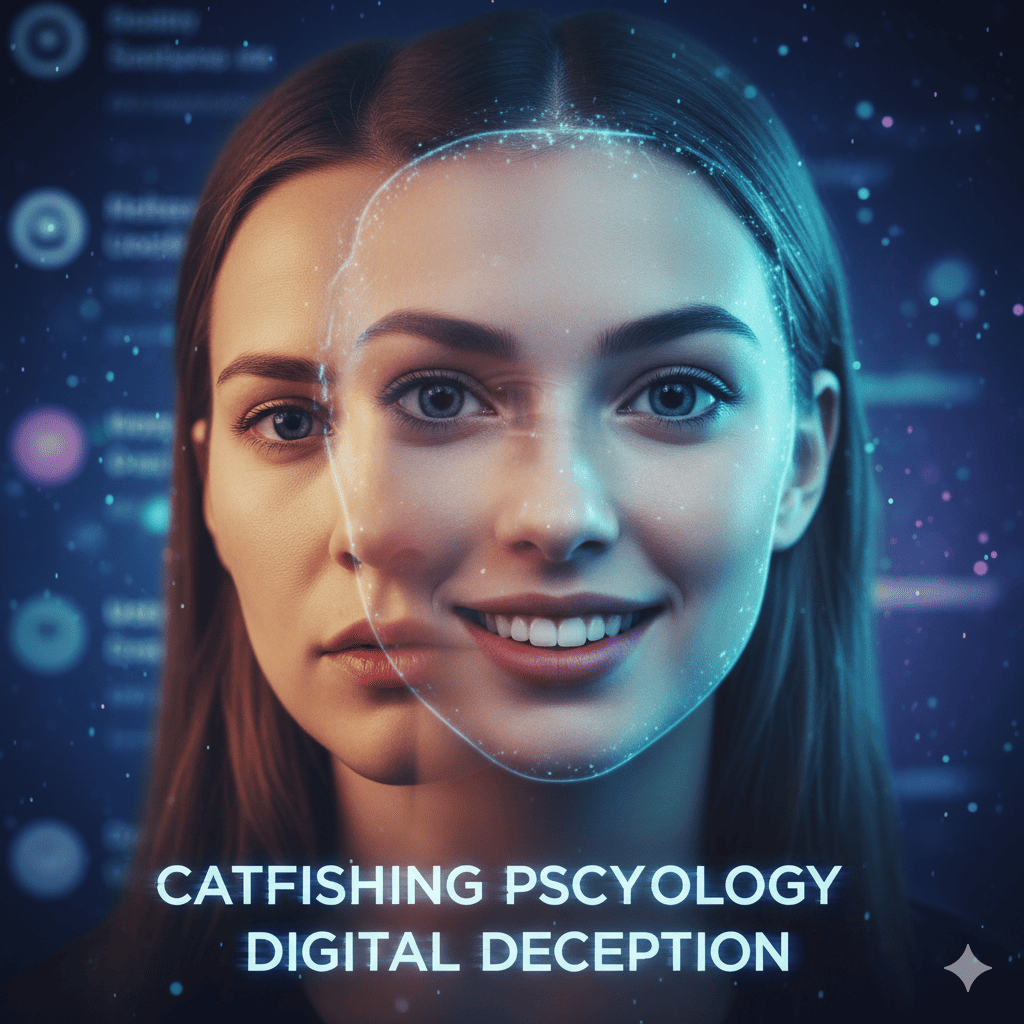In today’s hyper-connected world, digital spaces allow anyone to reinvent themselves for better or worse. But have you ever wondered why people pretend online? The answer lies in human psychology.
The internet gives people freedom from judgment, letting them build ideal versions of themselves. For some, this freedom fosters creativity and confidence. For others, it becomes a tool for deception leading to fake personas, catfishing, and emotional manipulation. Psychology of Online Deception: Why People Lie in Digital Relationships The catfishing psychology behind these behaviors is complex. Some pretend for attention, some for escape, and others for power or profit.
Understanding these psychological motives helps uncover the reasons people lie in digital relationships and equips you to recognize online deception early. By learning how and why people manipulate through false identities, you can better protect yourself from emotional harm and digital fraud in today’s connected world.
The psychology of digital pretending
Pretending online isn’t always malicious. In many cases, it starts as an emotional defense mechanism a way to fill gaps in self-esteem or escape real-world pressures.
Psychologists explain that anonymity online reduces accountability, allowing people to act out impulses they’d normally suppress. This “disinhibition effect” blurs moral lines and encourages experimentation with identity.
But over time, these false identities can spiral out of control. What starts as a small exaggeration can evolve into full-blown deception.
The link between self-image and catfishing psychology
Catfishing pretending to be someone else entirely is one of the most extreme expressions of digital deception. The catfishing psychology behind it reveals that most perpetrators aren’t just manipulative they’re often emotionally unfulfilled.
They crave connection but fear rejection, so they create avatars of who they wish they were. These personas are built to attract admiration, attention, or love without the risk of vulnerability.
According to behavioral studies, common motives for catfishing include:
- Low self-esteem – The real self feels “not good enough.”
- Curiosity – They want to explore how others react to a different identity.
- Escapism – A coping mechanism for loneliness, grief, or trauma.
- Revenge or power – Some use deception to manipulate or punish others.
- Financial gain – When emotional deception turns into romance scams.
Behind every fake profile lies a story sometimes tragic, sometimes predatory.

The role of attention in why people pretend online
Human beings are social creatures, wired to seek recognition. In the digital world, attention becomes a form of currency. Likes, followers, and messages validate self-worth.
People who feel invisible in real life may exaggerate or fabricate their online personas to feel noticed. This is especially common among users who:
- Struggle with loneliness or social anxiety
- Feel ignored or undervalued offline
- Desire fame or admiration
- Experience low confidence or dissatisfaction with appearance
In short, online pretending can be a form of self-medication soothing insecurity through digital validation.
Psychological insight:
When a post or photo receives attention, dopamine levels spike in the brain, creating an addictive feedback loop. Over time, people may rely on false identities to sustain that high.
Escapism: living a virtual double life
Another major driver behind why people pretend online is escapism. The internet provides an alternate reality one where problems, failures, and insecurities fade into pixels.
For people facing difficult lives abusive relationships, depression, or job stress online personas offer temporary relief. They can become someone confident, loved, or admired, even if it’s fiction.
This is especially visible in online games, forums, and dating apps where users adopt avatars or fake profiles. These digital alter egos serve as emotional shields, letting users explore aspects of themselves they suppress in real life.
However, escapism can turn destructive when the line between reality and fantasy disappears. When people invest emotionally in their false personas, they risk alienating real connections and losing touch with their authentic selves.
The hidden motives behind fake online identities
While attention and escapism explain many cases, some motives are darker. The rise of fake online identities has led to widespread emotional and financial damage through scams and exploitation.
Here are the hidden motives that drive malicious pretense:
1. Emotional manipulation
Scammers exploit empathy and affection to gain control over victims. By using false identities, they create trust and emotional dependence often leading to romance scams.
2. Financial gain
Fraudsters use fake profiles to solicit money, gifts, or cryptocurrency. These operations often involve organized networks posing as romantic partners.
3. Psychological power
Some derive pleasure from deceiving others a form of digital dominance. This narcissistic satisfaction reinforces the behavior, making it habitual.
4. Experimentation and thrill-seeking
For some, it’s not about harm it’s about curiosity. They enjoy playing different roles or seeing how others react to deception. But even “playful” pretending can cause real emotional damage to unsuspecting victims.
5. Revenge or social sabotage
Fake accounts are also used to harass, humiliate, or manipulate ex-partners or rivals a toxic form of control and retaliation.

Emotional consequences of deception
Pretending online may feel empowering at first, but the emotional toll is real for both deceivers and victims.
For the deceiver:
- Anxiety: Maintaining lies becomes exhausting.
- Guilt: Many feel shame once the deception is exposed.
- Identity confusion: They may lose touch with who they really are.
- Addiction: The rush of attention becomes hard to quit.
For the victim:
- Betrayal: Discovering a lie erodes trust in others.
- Humiliation: Many feel embarrassed for believing false stories.
- Emotional trauma: Victims often experience grief similar to heartbreak.
- Financial loss: In romance scams, the damage can be devastating.
The catfishing psychology cycle often ends in pain, no matter which side you’re on.
How social media fuels deception
Platforms like Instagram, TikTok, and dating apps encourage performance. They reward attractiveness, popularity, and engagement not authenticity.
This environment pressures users to create idealized versions of themselves, blurring the line between enhancement and deceit. Filters, curated lifestyles, and fake confidence form the “acceptable” level of pretending.
While not all exaggeration equals deception, the normalization of edited reality desensitizes users. The step from beautifying a selfie to faking an entire persona becomes dangerously small.
How to recognize fake online identities
Spotting digital deception isn’t always easy, but consistent red flags exist:
- They avoid video calls or face-to-face meetings.
- Their stories are inconsistent or overly dramatic.
- Their social media presence looks too new or too perfect.
- They express intense emotions too early in the relationship.
- They ask for money, gifts, or sympathy.
Always verify before you trust. Reverse-image search photos, confirm details, and communicate through verified apps.
Remember: genuine people don’t hide behind layers of secrecy.
How to protect your mental and emotional health
If you’ve encountered deception or suspect someone might be fake, here’s how to stay grounded:
- Trust behavior, not words. Consistency is the clearest sign of honesty.
- Limit emotional exposure. Don’t overshare early in online conversations.
- Stay skeptical but kind. You can be open-minded without being naïve.
- Seek real-world connections. Offline relationships build perspective and security.
- Report and block. Most platforms have tools to flag fake profiles or scams.
If you’ve been deceived, don’t internalize the blame. Many intelligent, emotionally strong people have fallen for fake online identities because empathy and trust are human strengths, not weaknesses.
Healing after digital betrayal
Recovering from deception takes emotional patience. It’s normal to grieve not just the person, but the illusion of connection.
Therapy or support groups can help rebuild self-confidence. Focusing on hobbies, exercise, and social support restores emotional resilience.
Most importantly, remember that the experience doesn’t define you. It teaches discernment and reminds you to seek connections rooted in truth, not fantasy.
The future of online authenticity
As technology advances, so will deception. AI-generated faces, deepfakes, and chatbot-driven profiles make it even harder to distinguish real from fake.
But there’s hope. Verification systems, AI-powered fraud detection, and stricter platform policies are emerging to combat deceit. Meanwhile, digital literacy understanding why people pretend online remains our best defense.
Ultimately, honesty and empathy must evolve alongside technology. Behind every screen is a human being one who deserves authenticity as much as affection.





